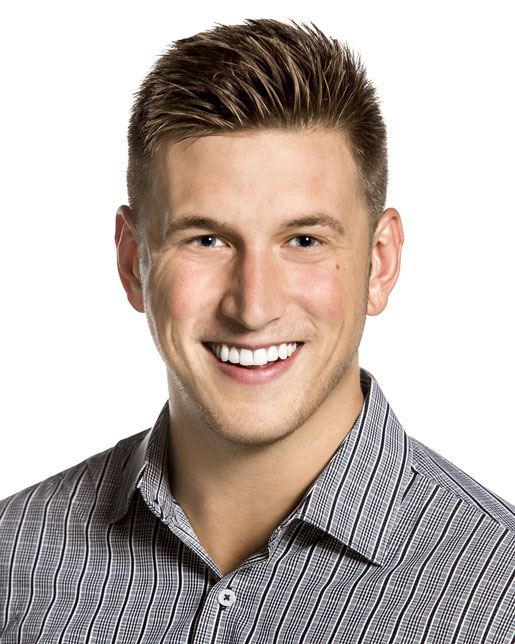Medtech's Rising Stars: Derek Mathers
Derek Mathers
July 27, 2016

Derek Mathers | |
Derek Mathers, 24--Director of R&D at Worrell, Adjunct Professor of 3-D Printing at the University of Minnesota After graduating from college two years ago, Mathers started in Business Development at Worrell, a healthcare innovation company that designs and prototypes devices, services, and therapies for OEMs and startups. He was attracted to the position because of its focus on product development and the opportunity to use 3-D printing in healthcare applications. 3-D printing is a passion for Mathers and he teaches a class on the subject at the University of Minnesota. The first initiative he worked on was a strategic R&D partnership with Stratasys (Mathers had sold Stratasys machines during his senior year of college). The partnership allowed Worrell to use a PolyJet 3-D printer to create injection molds, resulting in same-day production-level parts that could be used in human factors and mechanical engineering documentation. The 3-D injection molding initiative led to wider brand recognition for Worrell in the field of medical 3-D printing. The company also enjoyed its best financial year in history. Mathers was recently named Director of R&D at Worrell and is planning to build what he called "the world's most progressive prototyping lab dedicated to medical technology." What's next--in his own words: "In addition to organizing our space for maximum creativity and efficiency, we are in the midst of negotiating details to become a beta test partner for multiple next-generation 3-D scanning, 3-D printing, and virtual reality platforms. We believe that integrating these tools with our best-in-class research and human factors teams will give us an unprecedented speed, ability, and empathy by which to immerse our designers and clients into care situations. I am excited to push the limits of how 3D printing can be used to manufacture components for the human body, through partnerships with the University of Minnesota and beyond . . . [At Worrell] we are building a next-generation fab lab specifically for medical technologies, loaded with tools that aren't even available to the public yet. We are taking a principles-based approach to the purpose of this space, drawing our inspiration from three places: MIT's Media Lab, Stanford's Biodesign program, and the concept of an industrial commons. On a sidenote, I'm excited to see where the 3-D printing class I've taught for two years at the University of Minnesota will evolve to cater to a specifically medtech-related audience. So far we've taught over 200 students how to design for, operate, and optimize a 3-D printer." What are the biggest factors that helped you become a young innovator? "First and foremost, my family raised me to be a lifelong student. This desire for constant improvement is the reason why, two years out of college, I still try to read relevant science textbooks and try to improve my CAD skills with online courses. One of my favorite weekly reads is The Economist, because it gives you the cold hard facts and opinions of world and business situations. Most mornings, I read a handful of key industry newsletters, plus Google Alerts for design, medtech, pharma, and 3-D printing. I have an insatiable curiosity to learn more about science, technology, people and other cultures. This leads me to be genuinely interested and learn from my clients, students, and other friends I've met along the way. It definitely doesn't hurt to have a wonderful supporting cast in my family, friends, coworkers, and my girlfriend Leah. Secondly, the culture at Worrell has been a huge part of my success. I am lucky to work with a group of people in Minneapolis and Shanghai who combine technical knowledge, business expertise, and creativity in everything they do. The flat and transparent culture that Bob Worrell built and Kai Worrell leads has enabled us to accomplish things faster and more thoroughly than any of our competitors can, leading to extremely loyal clients with commercially successful products. Open communication channels between our multi-disciplinary teams has enabled me to learn more than I ever would have at a larger company." What is the biggest challenge you have faced so far? "The biggest challenge for me has been understanding the regulatory and reimbursement strategies for both medtech and pharmaceutical industries. At Worrell, we are working at the intersection of device and drug platforms so it is essential to know both. To my knowledge there were no courses at the University of Minnesota on FDA/CE regulatory pathways, or on how to get a reimbursement code for a medical device, so everything I've learned I've had to find on my own . . . Everyone in the medtech industry should read Biodesign, an important framework for developing and marketing new therapies. Secondly, the FDA is a wonderful educational resource and has a significant amount of materials on their website to help educate yourself on the different device applications and regulatory controls of both devices and drugs." | |
| |
| |
[Image courtesy of DEREK MATHERS] |
You May Also Like



.png?width=300&auto=webp&quality=80&disable=upscale)
